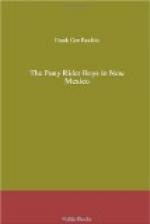After supper, the visitor invited all hands to ride over to his dug-out and spend the evening with him. The boys accepted gladly, never having seen the inside of a dug-out, and not knowing what one looked like. Professor Zepplin had taken a sudden liking to the man with the Christmas name, and soon the two were engaged in earnest conversation.
The distance being so short, Tad decided that they had better walk, leaving the ponies in charge of Juan so they might get a full night’s rest. Then all hands set out for the dug-out.
A short flight of steps led down into the place, the roof of which was raised just far enough above the ground to permit of two narrow windows on each side and at the rear end.
The room in which they found themselves, proved to be a combination kitchen and dining room. Its neatness and orderliness impressed them at once.
“And here,” said Kris Kringle, “is what I call my den,” throwing open a door leading into a rear room and lighting a hanging oil lamp.
The Pony Rider Boys uttered an exclamation of surprised delight.
On a hardwood floor lay a profusion of brightly colored Navajo rugs, the walls being hung with others of exquisite workmanship and coloring, interspersed with weapons and trophies of the chase, while in other parts of the room were rare specimens of pottery from ancient adobe houses of the Pueblos.
At the far end of the room was a great fire-place. Book cases, home-made, stood about the room, full of books. The Professor realized, at once, that they were in the home of a student and a collector.
“This is indeed an oasis in the desert,” he glowed. “I shall be loath to leave here.”
“Then don’t,” smiled Mr. Kringle. “I’m sure I am glad enough to have company. Seldom ever see anyone here, except now and then a roving band of Indians.”
“Indians!” exclaimed Tad. “Do you have any trouble with them?”
“Well, they know better than to bother with me much. We have had an occasional argument,” said their host, his jaws setting almost stubbornly for the instant. “Most of the tribes in the state are peaceful, though the Apaches are as bad as ever. They behave themselves because they have to, not because they wish to do so.”
“I saw their fire dance the other night,” began Tad.
“What?” demanded Mr. Kringle.
“Fire dance.”
“Tell me about it?”
Tad did so, the host listening with grave face until the recital was ended.
He shook his head disapprovingly.
“And this— this Indian that you knocked down— was he an Apache?”
“I don’t know. I think so, though. He had on a peculiar head dress
“That was one of them,” interrupted Mr. Kringle, with emphasis. “And I’ll wager you haven’t heard the last of him yet. That’s an insult which the Apache brave will harbor under his copper skin forever. He’ll wait for years, but he’ll get even if he can.”




